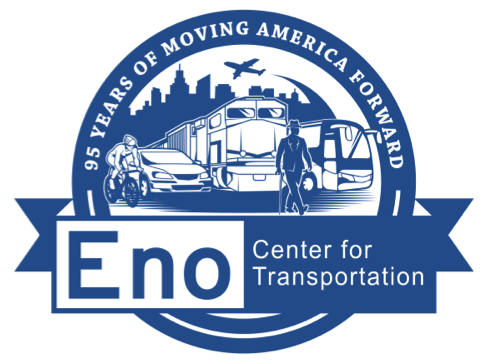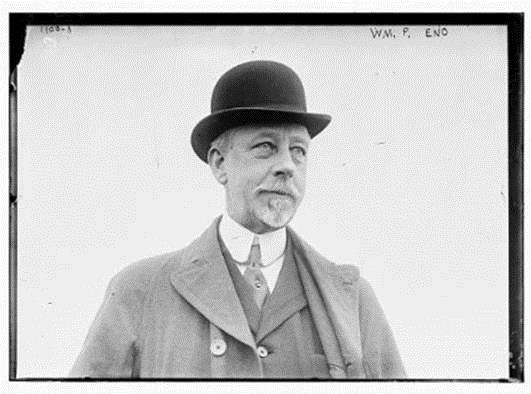 95 years ago today, on April 21, 1921, our founder, William Phelps Eno, created a corporation whose purpose was to perpetuate his life’s work – the promotion of safety and order on streets and highways. Mr. Eno’s lifelong passion for transportation helped turn the chaotic and dangerous streets of the early 1900s into a safe and organized environment for all those who utilized them.
95 years ago today, on April 21, 1921, our founder, William Phelps Eno, created a corporation whose purpose was to perpetuate his life’s work – the promotion of safety and order on streets and highways. Mr. Eno’s lifelong passion for transportation helped turn the chaotic and dangerous streets of the early 1900s into a safe and organized environment for all those who utilized them.
Both the organization he founded and American transportation have come a long way in 95 years.
Eno has evolved from a foundation – writing and regulating the very first rules of the road – to an independent non-profit think tank helping to impact emerging issues for the nation’s transportation system and cultivate the creative workforce that keeps the system moving.
Our nation’s transportation system has also changed drastically. The network of roads and runways, trains and planes, ports and pipes move people and goods from coast-to-coast and around the world. New technologies to provide traveler information, share vehicles, reduce emissions, move goods, and manage traffic change the way we interact in every facet of the system. It is the backbone of the American economy and historically the envy of the world.
Yet this is a challenging time. Roads and transit systems are aging and in dire need of repair. Tens of thousands of bridges are structurally deficient. Delays hamper our metropolitan ports and freight corridors, and lack of choices to connect people to jobs and economic opportunity is pervasive. The result of this physical neglect and lack of investment seriously compromises the efficiency of a network crucial to the national interest, with a price tag of needs conservatively estimated in the hundreds of billions.

William Phelps Eno, founder of The Eno Foundation for Highway for Highway Traffic Regulation – Now the Eno Center for Transportation.
And scarcity of capital resources—fiscal, human, political—means that some challenges are even bigger than they seem. Today, the role of Eno is more critical than ever and we intend to address these challenges.
Eno is intent upon remaining a national leader through this disruptive transportation moment and beyond.
In 1921, William Eno saw a burgeoning transportation system in dire need of guidance in order to grow. Nearly a century later, the Eno Center continues to be a leader in the transportation industry. Looking forward, we will continue our efforts to shape transportation policy and educate the workforce that moves people and goods on a day-to-day basis. While our long-time publication Transportation Quarterly has been retired, we will continue to improve Eno Transportation Weekly. Our policy shop continues to expand and solidify its reputation as an independent source for research and policy analysis. Our Center for Transportation Leadership continues to shape and support transportation leaders across all modes.
95 years is a very long time to be around. We at the Eno Center are tremendously thankful to all those who helped build and sustain this organization over the decades. It is impossible imagine what transportation will look like in next 95 years but because of our supporters, advisors, and staff, Eno is well-positioned to help achieve the broad vision of a transportation future that fosters economic vitality and improves quality of life for all.

 95 years ago today, on April 21, 1921, our founder, William Phelps Eno, created a corporation whose purpose was to perpetuate his life’s work – the promotion of safety and order on streets and highways. Mr. Eno’s lifelong passion for transportation helped turn the chaotic and dangerous streets of the early 1900s into a safe and organized environment for all those who utilized them.
95 years ago today, on April 21, 1921, our founder, William Phelps Eno, created a corporation whose purpose was to perpetuate his life’s work – the promotion of safety and order on streets and highways. Mr. Eno’s lifelong passion for transportation helped turn the chaotic and dangerous streets of the early 1900s into a safe and organized environment for all those who utilized them.


